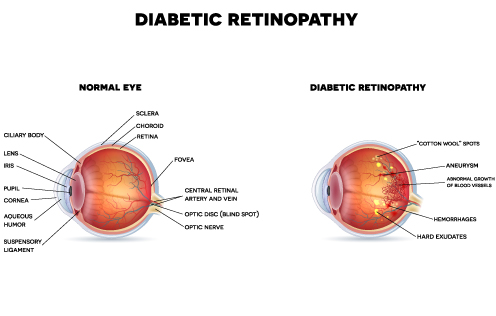Diabetic Retinopathy
Diabetic retinopathy is an eye condition that can cause vision loss and blindness in people who have diabetes. This is caused by having high blood sugar in your blood which can damage your retina (the thin light sensitive layer of tissue that lines the back of your eye). The sugar blocks the tiny blood vessels causing them to leak blood or fluid. Your eye will then start to make new blood vessels to compensate, however these vessels are weak and thin and tend to leak easily.
Anyone with type 1, type 2 or gestational diabetes is at risk. You can reduce your risk of developing diabetic retinopathy by controlling your diabetes.
If you have diabetes and have become pregnant recently or have developed gestational diabetes you should ask your GP to be referred for a full comprehensive dilated eye exam.
High blood pressure and high cholesterol also increases your risk of developing diabetic retinopathy.

What are the visual symptoms of diabetic retinopathy?
At first you may have no visual symptoms. You may then start to have trouble reading or seeing objects far away, these symptoms may come and go. As the condition progresses you may start to see dark black floating spots or streaks that look like cobwebs. This is caused by the blood leaking into the vitreous (gel like fluid inside your eye).
If left untreated you may also be at risk of developing Diabetic Macula Edema, Neovascular Glaucoma or Retinal Detachment.
What can I do to help prevent diabetic retinopathy?
Being active, eating healthy and taking your medications as per your GP to control your blood sugar levels is very important to control your diabetes.
How can my ophthalmologist exam and treat me?
Yearly eye exams are generally required to continuously monitor your retina.
You will receive eye drops that dilate your pupils along with having photos and scans performed by specialised equipment. Your ophthalmologist will then provide a full comprehensive eye exam to examine the health of your retina. Early detection is the best prevention.
If you do develop the condition and your vision starts to decline your ophthalmologist will want to see you more often than yearly and may suggest treatments such as injections, laser treatment or eye surgery.
For a consultation, diagnosis and further advice on diabetic retinopathy, please contact us on (07) 3217 7399 to schedule an appointment.
